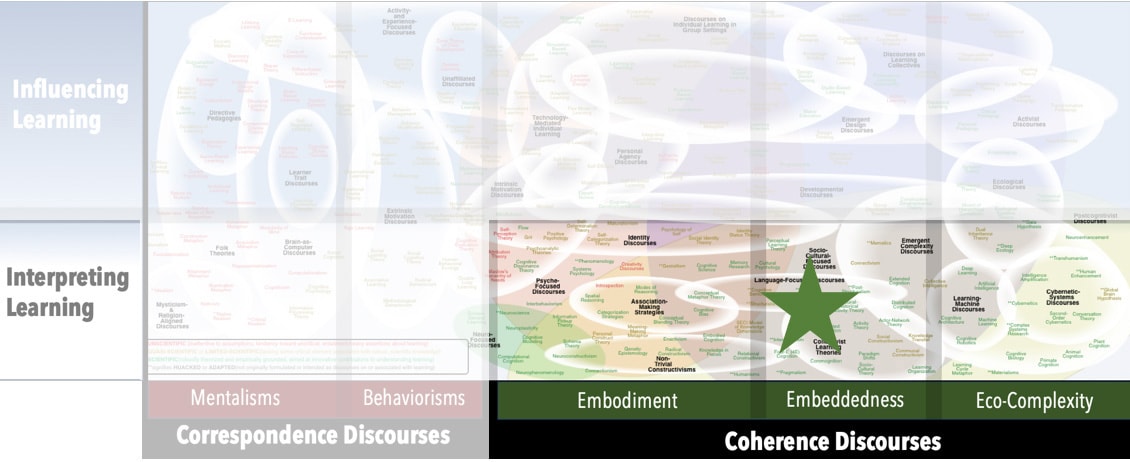Focus
Making sense of existence without relying on dualist assumptionsPrincipal Metaphors
- Knowledge is … the continuity of forms
- Knowing is … being
- Learner is … any form acting with/in other forms
- Learning is … becoming
- Teaching is … N/A
Originated
Ancient (entrenched in the language)Synopsis
Materialisms assert that everything in the universe is matter-based – and so, in one swoop, reject almost all Correspondence Discourses and their associated dualisms. Even ideas and consciousness are seen as the result of material interactions. Most materialisms accept evolutionary theory, and many recent versions embrace Eco-Complexity Discourses. Correspondingly, all reject notions of spirits, spirituality, fates, and deities as useful or valid explanatory devices. There are many varieties at play among discourses on learning. The ones that are currently most influential include:- Dialectical Materialism (Marxist Dialectics) is associated with most varieties of Critical Pedagogy. It is focused on such material conditions as social class and power structures in its efforts to prompt societal evolutions toward more just forms of social organization.
- Eliminative Materialism (Eliminativism) focuses mainly on concepts associated with “mind” Asserting that Folk Theories are mistaken, it looks to Neuroscience to one day reveal that such notions as intention, belief, desire, and love are by-products of inadequate natural languages rather than materially rooted.
- New Materialisms amplify the orienting tenets of Materialisms, with a particularly enthusiastic embrace of eco-centrism (i.e., displacing humans as the centre of inquiry) that emphasizes the rejection of human/non-human, animate/inanimate, and other dualisms already problematized by Materialisms. Most often, New Materialisms are aligned with Post-Structuralism.
- Ontological Materialism – the perspective that all phenomena – including those that are perceived or interpreted as mental, spiritual, and/or metaphysical – are due to matter and the interactions among matter
- Scientific Materialism (George Santayana, 1930s) – a phrase used to characterize the worldview of research scientists whose research is rooted in or aligned with Materialisms
- Socio-Materialism (Sociomaterialism; Sociomateriality) (Wanda Orlikowski, 2000s) – a perspective that frames human actions and interactions as constituted by the sociality and materiality of technologies and organizations
- Naturalism (Charles Albert Dubray; 1910s) – the view that only natural laws operate in this universe – entailing rejections of the supernatural, the spiritual, the metaphysical, and the idealistic. Related discourses include:
- Natural Philosophy (Philosophy of Nature) – the philosophical study of physics, which dominated discussions of rational and empirical inquiry prior to the Scientific Revolution and the emergence of modern science
- Naturalized Epistemology (W.V.O. Quine, 1960s) – a descriptive term applicable to any perspective on knowledge production that focuses on empirical methods of the natural sciences
- Cooperative Naturalism – the perspective that discussions of Epistemology should be informed by Cognitive Science research into how humans are structured to perceive/interpret the universe
- Replacement Naturalism (W.V.O. Quine, 1960s) – the conviction that perspectives and methodologies based in the natural sciences should replace more philosophical treatments of Epistemology
- Substantive Naturalism – a “hard” Naturalism, founded on the assertion that the only facts are those that can be verified through the methods of the natural sciences
- Physicalism (Otto Neurath, Rudolf Carnap; 1930s) – often used interchangeably with Materialisms, Physicalism is sometimes distinguished as being more explicit in its alignment with physics and its considerations of more than matter (e.g., energy, fundamental laws).
- Identity Theory (Central State Theory; Identity Theory of Mind) – an umbrella category that collects those theories founded on the conviction that some mental states are literally identical with some brain (i.e., physical) states. There are two main categories of Identity Theory:
- Type Identity Theory (Mind–Brain Identity Theory; Reductive Materialism; Type Identity Physicalism; Type Physicalism) (Ullin Place, 1950s) – a variety of Identity Theory that asserts there are specific “types” of mental events/states, and each can be identified with (and, hence, is reducible to) a physical event/state of the brain
- Token Identity Theory (Token Identity Physicalism) – a watered-down version of Type Identity Theory that asserts mental events have physical correlates in the brain, but that mental and physical events are not identical
Commentary
The most vocal criticisms of Materialisms are anchored to belief systems that rely on some combination of fundamental dualisms, such as human/natural, body/mind, or limited/omnipotent, including:- Hard Problem – the difficulty encountered within Materialisms of explaining the emergence of mind and consciousness
Authors and/or Prominent Influences
Charles Darwin; Karl MarxStatus as a Theory of Learning
Materialisms are not theories of learning, per se. However, like a few other recent theoretical offerings, they can be construed as presenting an account of material dynamics in which all activity is, in effect, learning/becoming.Status as a Theory of Teaching
Materialisms are not theories of teaching. That said, New Materialisms have been taken up by a number of educational researchers to interrogate matters of curriculum foci and teaching practices.Status as a Scientific Theory
Materialisms can be argued to be scientifically rigorous, at least those versions that embrace and encompass contemporary perspectives on evolution and complexity.Subdiscourses:
- Cooperative Naturalism
- Dialectical Materialism (Marxist Dialectics)
- Eliminative Materialism (Eliminativism)
- Hard Problem
- Identity Theory (Central State Theory; Identity Theory of Mind)
- Natural Philosophy (Philosophy of Nature)
- Naturalism
- Naturalized Epistemology
- New Materialisms
- Ontological Materialism
- Physicalism
- Replacement Naturalism
- Scientific Materialism
- Socio-Materialism (Sociomaterialism; Sociomateriality)
- Substantive Naturalism
- Token Identity Theory (Token Identity Physicalism)
- Type Identity Theory (Mind–Brain Identity Theory; Reductive Materialism; Type Identity Physicalism; Type Physicalism)
Map Location

Please cite this article as:
Davis, B., & Francis, K. (2024). “Materialisms” in Discourses on Learning in Education. https://learningdiscourses.com.
⇦ Back to Map
⇦ Back to List
